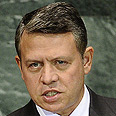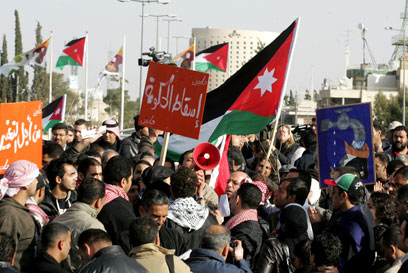
Around five thousand Jordanian protestors took to the streets of Amman on Friday demanding political liberalization, wider parliamentary representation and constitutional changes limiting the powers of the throne.
"Reform and change, this is the demand of people," angry protestors shouted among a mainly Islamists and leftist crowd joined by some tribal and liberal figures marching from the main Husseini mosque in the capital's downtown to a nearby square.
The Jordanian opposition, spearheaded by the mainstream Islamists, the country's largest political party, have been protesting for weeks for wider democratic gains as anti-government demonstrations sweep across the Arab world.
They are demanding more say, starting with a modern election law that broadens representation in parliament for inhabitants of the capital and the major cities of Zarqa and Irbid, where most of the country's seven million population live.
The cities which are Islamist strongholds and heavily populated by Jordanians of Palestinian origin are under-represented in the 120-seat assembly in favor of sparsely populated rural and Bedouin areas inhabited mainly by native Jordanians, or so called East Bankers who are the backbone of support for the throne.
"We tell our government that reform has become a necessity that cannot wait," Sheikh Hamza Mansour, the head of the Islamic Action Front (IAF), the country's largest opposition group, told the crowds in a rally at the end of the march.
"It's not just the demand of the Islamist movement or the opposition party. It's the demand of all Jordanians," he added.
'We demand end of this government'
Protestors chanted: "The people want to reform the regime", "we want a fair electoral law", and "people want an elected government".
The Arab world has erupted in protests aimed at ousting long-standing rulers, but protests in Jordan have focused on holding free elections and fighting corruption.
Jordanians see the throne as a unifying force and arbiter among competing tribes from the East Bank and a Palestinian majority from the West Bank.

'Constitutional changes.' Rally in Jordan (Photo: AFP)
The Islamist and leftist opposition, along with growing traditional voices, want the monarch to move Jordan towards a true constitutional monarchy with a prime minister who is selected by parliament rather than appointed by the palace.
"We want constitutional changes that bring us a parliamentary government and makes parliament truly representative of the Jordanian people," Mansour added.
King Abdullah has faced stiff resistance to his efforts to modernize the tribally structured kingdom from a powerful conservative establishment in the state and the security apparatus that holds a tight grip on power.
He has called on the government to move quickly on reforms that he acknowledged had stumbled.
Prime Minister Marouf al-Bakhit's government promised this week to open a dialogue soon with a wide cross section of Jordanians, including the Islamist and leftist opposition and civic groups, on how to speed up electoral reforms and lift curbs on public freedoms.
But many Jordanians, who have seen successive governments fail to deliver on promises of reforms, remain deeply skeptical.
Also on Friday, tens of thousands of people filled the streets of central Tunis in what they called a "day of rage", calling for the resignation of Prime Minister Mohamed Ghannouchi, a former ally of the ousted president.
The demonstration appeared to be the biggest since uprisings in North Africa's most developed country ended President Zine al-Abidine Ben Ali's 23-year rule on Jan. 14 and sparked pro-democracy protests across the Arab world, witnesses said.
Protesters, some carrying images of Ghannouchi's face merging seamlesly into that of the Ben Ali's, shouted "shame on the government!" and "Ghannouchi step down!" in a din that could be heard for miles.
"The only demand we have is the end of this government," said Alia Soussi, a 22-year-old student joining the rally. "We hope Ghannouchi gets the message."
- Follow Ynetnews on Facebook















